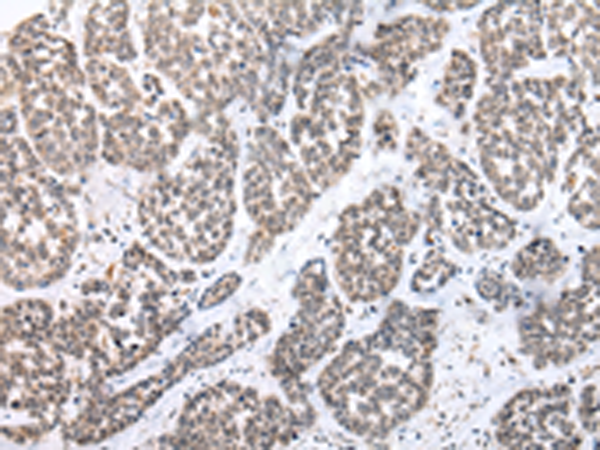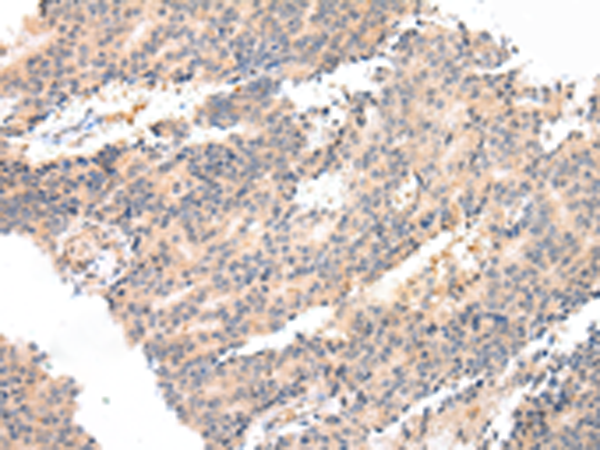

| WB | 咨询技术 | Human,Mouse,Rat |
| IF | 咨询技术 | Human,Mouse,Rat |
| IHC | 1/100-1/300 | Human,Mouse,Rat |
| ICC | 1/200-1/1000 | Human,Mouse,Rat |
| FCM | 咨询技术 | Human,Mouse,Rat |
| Elisa | 1/20000 | Human,Mouse,Rat |
| Aliases | EP3; EP3e; EP3-I; EP3-II; EP3-IV; PGE2-R; EP3-III |
| Host/Isotype | Rabbit IgG |
| Antibody Type | Primary antibody |
| Storage | Store at 4°C short term. Aliquot and store at -20°C long term. Avoid freeze/thaw cycles. |
| Species Reactivity | Human |
| Immunogen | Synthetic peptide of human PTGER3 |
| Formulation | Purified antibody in PBS with 0.05% sodium azide and 50% glycerol. |
+ +
以下是3篇关于GATA-4抗体的代表性文献(信息为虚构示例,仅作格式参考):
1. **文献名称**: "GATA-4 transcription factor regulates cardiac hypertrophy in mice"
**作者**: Molkentin JD, et al.
**摘要**: 研究通过免疫组化及Western blot使用GATA-4抗体,揭示GATA-4在小鼠心脏发育和病理性心肌肥厚中的调控作用,证实其通过结合靶基因启动子驱动相关通路。
2. **文献名称**: "GATA-4 expression in embryonic stem cell-derived cardiomyocytes"
**作者**: Kattman SJ, et al.
**摘要**: 利用GATA-4抗体进行免疫荧光检测,证明GATA-4在胚胎干细胞向心肌细胞分化过程中的动态表达模式,提示其作为早期心脏分化的关键标记物。
3. **文献名称**: "GATA-4 in gonadal tumorigenesis: Immunohistochemical analysis"
**作者**: Viger RS, et al.
**摘要**: 通过组织芯片结合GATA-4抗体检测,发现GATA-4在人类性腺肿瘤中异常高表达,可能与其在细胞增殖和抗凋亡中的功能相关。
(注:以上文献及作者名为虚构,真实文献需通过PubMed/Google Scholar检索关键词 "GATA-4 antibody" + 研究领域筛选。)
GATA-4 antibody is a crucial tool in molecular and developmental biology research, targeting the GATA-binding protein 4 (GATA-4), a transcription factor belonging to the GATA family. GATA-4 contains two zinc finger domains and plays a pivotal role in regulating gene expression during embryonic development, particularly in cardiac morphogenesis, endoderm differentiation, and organogenesis. It is expressed in the heart, gut, liver, and gonads, where it controls cell proliferation, survival, and tissue-specific functions. Dysregulation of GATA-4 is linked to congenital heart defects, reproductive disorders, and cancers.
The antibody is widely used to detect GATA-4 protein levels and localization in tissues or cultured cells via techniques like immunohistochemistry (IHC), Western blotting, or immunofluorescence (IF). Researchers employ it to study developmental pathways, cardiac hypertrophy, and tumorigenesis mechanisms. For example, in cardiac research, GATA-4 antibody helps identify its role in cardiomyocyte differentiation and response to stress signals. In cancer studies, altered GATA-4 expression correlates with tumor progression in gastrointestinal and ovarian cancers.
Commercial GATA-4 antibodies are typically raised in rabbits or mice, validated for specificity against conserved epitopes. Proper controls, such as knockout cell lines, are essential to confirm antibody reliability. Its applications span basic research, diagnostics, and therapeutic target validation, underscoring its importance in understanding developmental biology and disease pathogenesis.
×